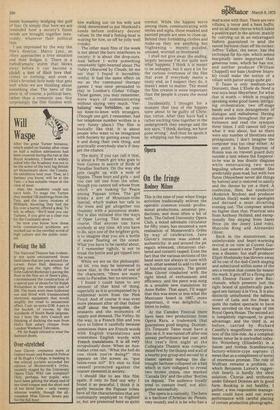Opera
On the fringe
Rodney Mikes
This is the time of year when fringe activities traditionally enliven the operatic common round: professional productions, amateur productions, and most often a bit of both. The Oxford University Opera Club, a noted adrenalin circulator for fifty years, has mounted a new realisation of Monteverdi's Orfeo by way of celebration. Jane Glover's version was aimed at authenticity: in and around the pit regals wheezed, chitarroni clattered and cornetti rasped. Even the fact that the various sections of the band were not always in tune with each other seemed to add to the air of historical accuracy. The genial Miss Glover conducted with the right blend of enthusiasm and efficiency, and the piece was sung in a sensible new translation by Anne Ridler. That apart, I'll wager that this was more or less what the Mantuans heard in 1607; more importaqt, it was delightful to listen to today.
At the Camden Festival there have been two productions from Opera Rara, a trademark that guarantees good singing. Donizetti's Torquato Tasso must have a jinx on it. It was rained off after one uneasy performance last year, and this year's first night at the Collegiate Theatre was compromised first by the thump and wail of a nearby pop group and second by a classic operatic mishap: the distraught baritone collapsed on a bed which in turn collapsed to reveal two brown crates, one marked 'Canada Dry' and the other 'Bottles on deposit.' The audience loyally tried to contain itself, not altogether successfully.
The opera is a curiosity. The hero is a baritone (Christian du Plessis, very sound), and it is he who has a mad scene with flute. There are two villains, a tenor and a bass buffo, and an all-male chorus which takes a positive part in the action, mainly by carrying on in an extravagant fashion guaranteed to send the sanest baritone clean off his rocker. Jeffrey. Talbot, the tenor, has the technique for his role, which seems marginally more important than generous tone, which he has not, and neither producer (William Chappell) nor bass (Andrew Snarski) could make the notion of a villain with patter songs quite gel .
If Tasso is only medium-rare Donizetti, then L'Etoile du Nord is real soya-bean Meyerbeer, for what that is worth — which is roughly speaking some good tunes, intriguing orchestration, two off-stage bands and a nice derangement of dialogue and melodrame. Having stayed awake throughout the performance and read the synopsis three times, I still cannot tell you what it was about, but as there were any number of librettists and protagonists, I don't imagine the composer was too clear either. At one point a future Empress of Russia was on travesti guard duty outside a tent where the Emperorto-be was in less drastic disguise while entertaining two most beguiling whores de combat. She predictably goes mad, but with two flutes (Meyerbeer never did things by halves) and is restored to sanity and the throne by yet a third. A confection, then, but conductor' (Roderick Brydon) and producer (Adrian Slack) made no apologies and devised a most diverting evening out. The composer aimed no higher than that Practical sets from Anthony Holland, and exceptionally fine singing from Janet Price (in the Jenny Lind role), Malcolm King and Alexander Oliver.
Back in the mainstream, an unbelievable and heart-warming revival is on view at Covent Garden. Last season's new Tannhduser was a disaster, but staff producer Elijah Moshinsky has thrown away all he can of the dud-Czech staging and substituted within some of the sets a version that comes far nearer the mark. It gets off to a flying start with Eleanor Fazan's new Bacchanale, which presents just the right brand of synthetically packaged sex-fantasy a /a Viva. It is also distinctly unbuttoned: the tableau vivant of Leda and the Swan is quite the rudest spectacle to have been unveiled on the .stage of the Royal Opera House. The second act is completely regrouped, to great advantage, and the third is, as before, carried by Richard Cassilly's magnificent interpretation of the title-role. As a compleat heroic tenor he is unrivalled today. Siv Wennberg (Elisabeth) is a lissom and tireless Scandinavian factory-whistle-type soprano (I mean that as a compliment of sorts) of enormous promise. The role of Wolfram remains a problem, to which Benjamin Luxon's ruggerclub hearty is hardly the ideal solution. Chorus and orchestra under Edward Downes are in good form. Booking is not healthy, I gather; a less responsible management could have sold out every performance with careful placing of certain production photographs..










































 Previous page
Previous page